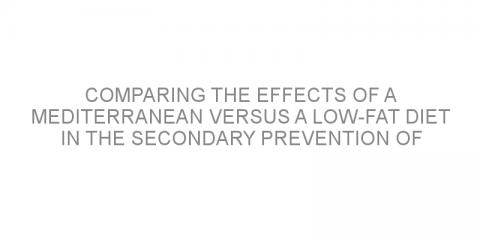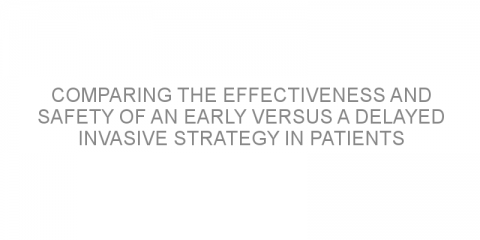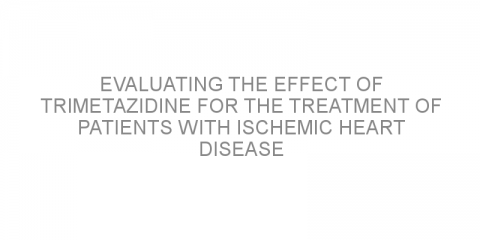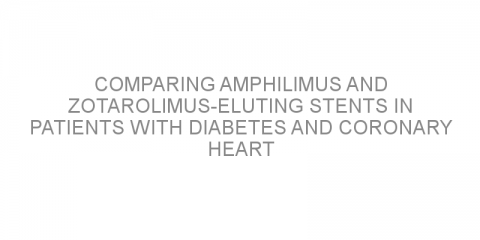In a nutshell This study compared the effects of a Mediterranean versus a low-fat diet in the secondary prevention of major cardiovascular events (MACE) in patients with established coronary artery disease (CAD). The data showed that in secondary prevention, the Mediterranean diet was more effective in preventing MACEs compared to a low-fat diet in...
Read MoreCoronary artery disease Posts on Medivizor
Comparing the effectiveness and safety of an early versus a delayed invasive strategy in patients with non-ST elevation acute coronary syndrome.
In a nutshell This study compared the effectiveness and safety of an early and a delayed invasive strategy (IS) in patients with non-ST elevation acute coronary syndrome (NSTE-ACS). The data showed that there were no significant differences in the risk of death, heart attacks, stroke rates, major bleeding, or revascularization between early and delayed...
Read MoreComparing the effectiveness and safety of short-term versus long-term dual antiplatelet therapy after percutaneous coronary intervention in patients at high bleeding risk.
In a nutshell This study compared the effectiveness and safety of short-term versus long-term dual antiplatelet therapy (DAPT) after percutaneous coronary intervention (PCI) using drug-eluting stents (DES) in patients at high bleeding risk. The data showed that short-term DAPT significantly reduced the risk of bleeding compared with long-term DAPT...
Read MoreComparing the effectiveness and safety of percutaneous coronary intervention versus coronary artery bypass grafting in patients with left main coronary artery disease.
In a nutshell This study compared the effectiveness and safety of percutaneous coronary intervention (PCI) using drug-eluting stents (DES) versus coronary artery bypass grafting (CABG) in patients with left main (LM) coronary artery disease (CAD). The data showed that both treatments were associated with a similar risk of heart attack, stroke, and death....
Read MoreEvaluating the effect of trimetazidine for the treatment of patients with ischemic heart disease who are not suitable for revascularization.
In a nutshell This study evaluated the effectiveness of trimetazidine (Vastarel) versus other anti-anginal drugs for the treatment of patients with ischemic heart disease (IHD) who are not suitable for revascularization. The data showed that trimetazidine improved walking time and angina attacks in these patients. Some background Coronary artery...
Read MoreTaking daily aspirin? Talk to your doctor.
Do you take a dose of baby aspirin once a day? Are you doing this under doctor’s orders or just because you heard it prevented heart attack or stroke? There is growing evidence against taking a low-dose aspirin daily for preventing cardiovascular events. But many well-intentioned people still take daily aspirin. A 2019 report by Harvard...
Read MoreIs clopidogrel better than ticagrelor in reducing bleeding in stabilized patients with myocardial infarction undergoing percutaneous coronary intervention ?
In a nutshell This study investigated if de-escalation (reducing the intensity) of dual antiplatelet therapy (DAPT) with clopidogrel (Plavix) might be better than ticagrelor (Brilique)-based antiplatelet therapy in stabilized patients with acute myocardial infarction (MI; heart attack) undergoing percutaneous coronary intervention (PCI). The data...
Read MoreIs yoga-based cardiac rehabilitation beneficial for patients with coronary artery disease?
In a nutshell This study evaluated if yoga-based cardiac rehabilitation leads to reduced heart-related risk factors in patients with coronary artery disease (CAD) compared to standard care. The data showed that the addition of yoga to standard care showed overall improvements in the cardiac health and quality of life of these patients. Some...
Read MoreComparing amphilimus and zotarolimus-eluting stents in patients with diabetes and coronary heart disease.
In a nutshell This study compared Cre8 EVO (amphilimus-eluting) stents to Resolute Onyx (zotarolimus-eluting) stents in patients with diabetes and CAD undergoing percutaneous coronary intervention (PCI). The authors concluded that Cre8 EVO stents were similar or better than Resolute Onyx stents in these patients. Some background...
Read MoreDoes long-term ticagrelor treatment improve outcomes in patients with previous percutaneous coronary intervention?
In a nutshell This study looked at long-term treatment with ticagrelor (Brilique) after percutaneous coronary intervention (PCI) in patients with coronary artery disease (CAD). It found that compared to patients treated with placebo, those treated with ticagrelor were less likely to have a major cardiovascular event (MACE). Some...
Read MoreIs colchicine beneficial in the management of coronary artery disease?
In a nutshell This study looked at the use of colchicine (Colcrys) in patients with coronary artery disease (CAD). It found that colchicine reduced the risk of heart attack and stroke in these patients. Some background CAD is a condition affecting the blood vessels in the heart. It leads to narrow or blocked blood vessels. It can...
Read MoreDoes high-dose statin treatment before percutaneous coronary intervention improve outcomes in patients with coronary artery disease?
In a nutshell This study looked at the use of high-dose statin treatment before percutaneous coronary intervention (PCI) in patients with coronary artery disease (CAD). It found that patients who received high-dose statin treatment before PCI were less likely to have a major cardiovascular event (MACE) defined as a heart attack or stroke in the next...
Read More














